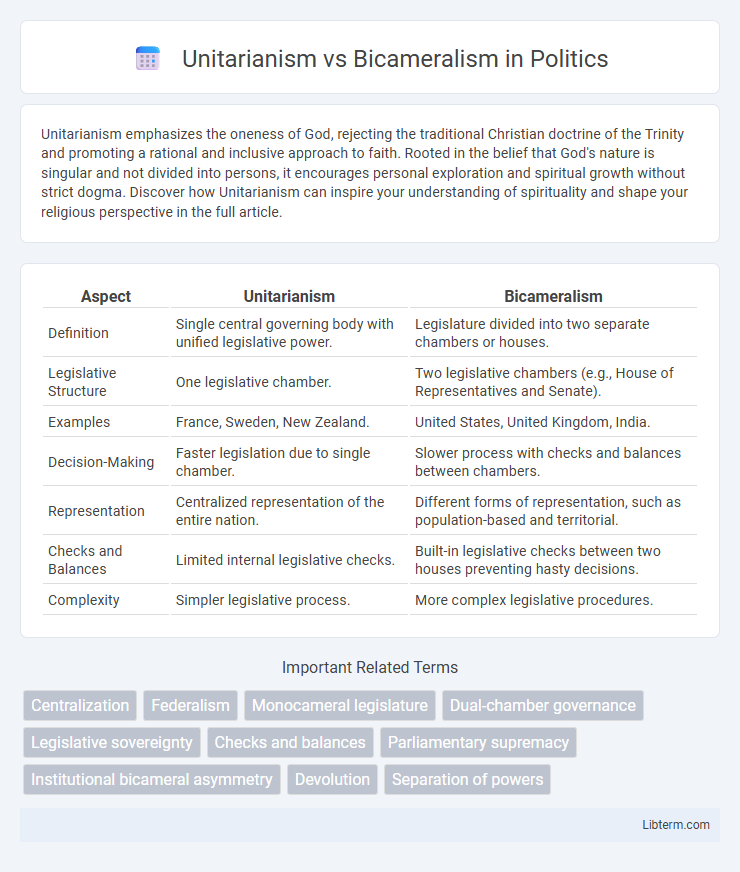Unitarianism emphasizes the oneness of God, rejecting the traditional Christian doctrine of the Trinity and promoting a rational and inclusive approach to faith. Rooted in the belief that God's nature is singular and not divided into persons, it encourages personal exploration and spiritual growth without strict dogma. Discover how Unitarianism can inspire your understanding of spirituality and shape your religious perspective in the full article.
Table of Comparison
| Aspect | Unitarianism | Bicameralism |
|---|---|---|
| Definition | Single central governing body with unified legislative power. | Legislature divided into two separate chambers or houses. |
| Legislative Structure | One legislative chamber. | Two legislative chambers (e.g., House of Representatives and Senate). |
| Examples | France, Sweden, New Zealand. | United States, United Kingdom, India. |
| Decision-Making | Faster legislation due to single chamber. | Slower process with checks and balances between chambers. |
| Representation | Centralized representation of the entire nation. | Different forms of representation, such as population-based and territorial. |
| Checks and Balances | Limited internal legislative checks. | Built-in legislative checks between two houses preventing hasty decisions. |
| Complexity | Simpler legislative process. | More complex legislative procedures. |
Introduction to Unitarianism and Bicameralism
Unitarianism emphasizes a centralized government structure where all governing power is vested in a single legislative body, promoting uniform policies and streamlined decision-making. Bicameralism divides the legislature into two separate chambers, typically an upper and a lower house, to balance representation and prevent the concentration of political power. These contrasting systems reflect different approaches to governance, affecting legislative efficiency, accountability, and federalism.
Defining Unitarian Parliamentary Systems
Unitarian parliamentary systems centralize legislative authority within a single, unified chamber, streamlining law-making processes and fostering cohesive governance. These systems contrast with bicameralism, which divides the legislature into two distinct chambers, often leading to more complex deliberation and checks on power. Countries such as the United Kingdom and New Zealand exemplify unitarian parliamentary models where a single legislative body dominates policy decisions.
Understanding Bicameral Legislative Structures
Bicameral legislative structures consist of two distinct chambers, typically an upper and a lower house, designed to provide checks and balances within a government system. This division allows for more comprehensive review and deliberation of legislation, enhancing representation by balancing diverse regional, social, or political interests. In contrast, Unitarianism advocates for a single centralized legislative body, emphasizing streamlined decision-making but potentially limiting the breadth of representation afforded by bicameral frameworks.
Historical Evolution of Unitarianism and Bicameralism
Unitarianism emerged during the Enlightenment as a theological movement rejecting the traditional Christian doctrine of the Trinity, emphasizing the oneness of God and rational spirituality, with roots tracing back to the 16th-century anti-Trinitarian reformers. Bicameralism developed historically as a legislative framework dividing parliamentary authority into two separate chambers, reflecting medieval practices of representing different social estates and evolving through the English Parliament's House of Commons and House of Lords in the 14th century. The historical evolution of Unitarianism highlights religious reform and doctrinal simplicity, whereas bicameralism reflects political compromise and institutional balance in governance structures.
Key Structural Differences
Unitarianism features a single, centralized legislative body responsible for making laws, ensuring streamlined decision-making and uniform policies across the entire state. Bicameralism divides the legislature into two separate chambers--typically an upper and a lower house--providing a system of checks and balances and representing different interests such as regions or social classes. This structural distinction significantly impacts the legislative process, with bicameral systems often allowing for more thorough debate and review compared to the more direct approach of unitarian legislatures.
Advantages of Unitarianism
Unitarianism offers streamlined governance by centralizing legislative power, which enhances policy consistency and reduces regional disparities across the nation. This system facilitates faster decision-making processes and unified national strategies, benefiting economic development and public administration. By avoiding legislative deadlocks common in bicameral systems, unitarian governments often achieve more efficient lawmaking and stronger executive accountability.
Benefits of Bicameralism
Bicameralism enhances legislative scrutiny by dividing lawmaking responsibilities between two chambers, reducing the risk of hasty or poorly considered legislation. It promotes diverse representation, ensuring both regional and population-based interests are addressed, which can lead to more balanced and equitable policy outcomes. The system also fosters checks and balances within the legislature, preventing concentration of power and encouraging thorough debate and compromise.
Challenges and Criticisms of Each System
Unitarianism faces challenges related to the centralization of power, which can lead to the marginalization of regional interests and reduce local autonomy, causing friction in diverse or large nations. Bicameralism is often criticized for legislative inefficiency and potential gridlock, as the necessity for approval from two chambers can delay lawmaking and amplify political conflicts. Both systems must balance representation and efficiency, with unitarism risking authoritarianism and bicameralism grappling with complexity and slower decision-making processes.
Global Examples and Case Studies
Unitarianism, exemplified by France and Japan, centralizes legislative power within a single parliamentary chamber, promoting uniform policy implementation and national cohesion. Bicameralism, observed in countries like the United States and India, features two legislative chambers--often a lower house representing the population and an upper house representing regional or state interests--enhancing checks and balances and accommodating diverse regional identities. Case studies reveal that unitary systems facilitate quicker lawmaking, whereas bicameral systems provide robust debate and prevent hasty legislation, reflecting differing priorities in governance structures worldwide.
Conclusion: Evaluating Unitarianism vs Bicameralism
Unitarianism centralizes legislative authority in a single chamber, streamlining lawmaking and enhancing efficiency, while bicameralism divides power between two chambers, promoting checks and balances and preventing legislative overreach. The choice between unitarian and bicameral systems depends on desired governance outcomes, with unitarianism favoring decisiveness and bicameralism fostering deliberation and representation diversity. Effective evaluation requires weighing factors such as political stability, representation equity, and institutional complexity in specific national contexts.
Unitarianism Infographic

 libterm.com
libterm.com